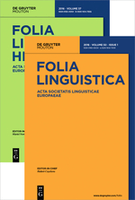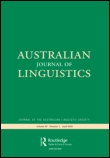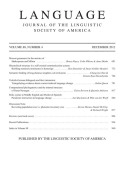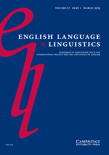
Revue Roumaine de Linguistique-Romanian Review of Linguistics
Scope & Guideline
Cultivating Knowledge in Linguistic Research.
Introduction
Aims and Scopes
- Linguistic Structure and Morphology:
The journal explores the intricate structures of languages, with a strong emphasis on Romanian grammar, morphology, and syntax. This includes the examination of pronouns, clitics, and verb forms, contributing to the understanding of language mechanics. - Language Contact and Variation:
A significant focus is placed on language contact phenomena, particularly how languages influence each other in multilingual settings. Studies often investigate the impact of external linguistic forces on the evolution of Romanian and its dialects. - Sociolinguistics and Pragmatics:
The journal also addresses sociolinguistic aspects, examining how language functions in social contexts, including discourse practices, language attitudes, and the role of language in media. - Historical Linguistics and Diachronic Studies:
Research often delves into the historical development of the Romanian language and its dialects, analyzing changes over time and their implications for modern linguistic theory. - Lexicography and Language Documentation:
The journal contributes to the field of lexicography by publishing dictionaries and studies on lexical items, which are crucial for understanding the vocabulary and semantic fields of Romanian and its varieties.
Trending and Emerging
- Corpus-Based Linguistics:
There is a growing trend towards utilizing corpus-based methodologies to study language, as evidenced by the increasing number of papers focusing on collocations, lexical choices, and discourse practices through empirical data. - Language Contact and Bilingualism:
Research on language contact, particularly in multilingual environments, is on the rise, reflecting the complexities of bilingualism and the resulting linguistic phenomena in Romanian and other languages. - Digital Linguistics and Media Language:
The impact of digital communication and media on language use is becoming a significant area of interest, with studies analyzing how online platforms influence linguistic practices and discourse. - Language Teaching and Learning:
There is an emerging focus on language pedagogy, particularly concerning the teaching of Romanian as a foreign language, highlighting the importance of practical applications of linguistic research. - Pragmatics and Discourse Analysis:
The journal is increasingly publishing studies that investigate pragmatic aspects of language use, including discourse markers and communicative strategies, indicating a shift towards understanding language in context.
Declining or Waning
- Traditional Dialect Studies:
There has been a noticeable decrease in the publication of papers focused exclusively on traditional dialect studies, suggesting a shift towards more contemporary linguistic issues and methodologies. - Comparative Romance Linguistics:
While comparative studies among Romance languages were once a significant area of interest, recent publications show a waning focus on this theme, possibly due to the increasing specificity of research concentrating on individual languages. - Phonetic and Phonological Analyses:
The frequency of phonetic and phonological analyses in the journal seems to be declining, which may reflect a broader trend in linguistic research favoring syntax, semantics, and sociolinguistic perspectives over traditional phonetic studies.
Similar Journals

Lingue e Linguaggio
Exploring the Dynamics of Language and ThoughtLingue e Linguaggio, published by SOC ED IL MULINO, is a distinguished academic journal in the field of Linguistics and Language, hailing from Bologna, Italy. With an esteemed Q2 ranking in its category as of 2023, this journal is recognized for its contributions to both the arts and humanities as well as social sciences, achieving notable positions within Scopus rankings. It serves as a vital platform for researchers, practitioners, and students interested in exploring various linguistic phenomena, language dynamics, and theoretical frameworks. Although it operates under a traditional subscription model rather than open access, its comprehensive array of studies and publications provides significant insights and fosters academic discourse. With a publication period extending from 2002 to 2024, Lingue e Linguaggio continues to be a key resource for advancing the understanding of language in contemporary contexts.

Journal of Slavic Linguistics
Fostering Insights into Slavic Phonetics and SyntaxJournal of Slavic Linguistics, published by SLAVICA PUBLISHERS, is a key academic resource dedicated to the exploration of Slavic languages and linguistics. Established to provide a comprehensive platform for scholarly research, this journal addresses the intricate dynamics of Slavic phonetics, syntax, semantics, and discourse, making significant contributions to both theoretical and applied linguistics. The journal holds an impact factor that reflects its value in the linguistic community, particularly as it is ranked in the Q4 category in Linguistics and Language for 2023. With a focus on a wide range of topics within the field, the Journal of Slavic Linguistics serves as an essential reference for researchers, educators, and students alike, fostering an appreciation and deeper understanding of Slavic linguistic phenomena. Although currently not an Open Access journal, it remains accessible to a broad audience keen on engaging with contemporary linguistic scholarship.

FOLIA LINGUISTICA
Elevating Understanding of Language Structures and UsageFOLIA LINGUISTICA, published by WALTER DE GRUYTER GMBH, is a premier scholarly journal dedicated to the field of linguistics. Established in 1967, the journal has consistently provided a platform for innovative research and scholarly discourse in language and linguistics, contributing significantly to the academic community's understanding of language structures, usage, and cognitive processes. With its classification in the top quartile (Q1) of linguistics and language in 2023, FOLIA LINGUISTICA holds a respectable rank (#282/1088) within the Arts and Humanities category and an admirable percentile rank of 74th, ensuring its position at the forefront of linguistic scholarship. Researchers and academics from around the globe can access a wealth of knowledge and cutting-edge research findings through this esteemed publication, which is vital for anyone looking to engage with the latest advancements in linguistics. Located in Berlin, Germany, FOLIA LINGUISTICA encompasses all aspects of language research, making it an indispensable resource for researchers, professionals, and students alike seeking to deepen their understanding of language and its complexities.

Catalan Journal of Linguistics
Unlocking Insights into Linguistic Theory and Practice.Catalan Journal of Linguistics is a distinguished academic publication dedicated to the dynamic field of linguistics and language studies. Published by the Universitat Autònoma de Barcelona, this open-access journal has been disseminating impactful research since 2002, making significant contributions to the understanding of linguistic theory, language acquisition, and sociolinguistics, particularly within the Catalan language context. With a robust engagement in the scholarly community, it proudly holds a Q2 ranking in Linguistics and Language as of 2023, reflecting its commitment to high standards of research and innovation. The journal is accessible to a global audience, promoting the free exchange of knowledge beyond geographical boundaries, and serves as an essential platform for researchers, professionals, and students aiming to stay at the forefront of linguistic inquiry. With its rich archive of articles, the Catalan Journal of Linguistics stands as a vital resource for anyone keen to explore contemporary linguistic issues and advancements.

Australian Journal of Linguistics
Unveiling the Nuances of Language and CommunicationThe Australian Journal of Linguistics, published by Routledge Journals, Taylor & Francis Ltd, stands as a distinguished platform in the field of linguistics, fostering rigorous academic discourse since its inception in 1981. With an ISSN of 0726-8602 and an E-ISSN of 1469-2996, the journal has achieved a notable Q2 ranking in the linguistics and language category for 2023, indicating its quality and relevance within the academic community. With a Scopus ranking of #316 in Arts & Humanities and #373 in Social Sciences, it sits in the 71st and 68th percentiles respectively, underscoring its impact in the fields it encompasses. The journal aims to publish high-quality research articles that contribute to the understanding of linguistic theory, sociolinguistics, and applied linguistics, making it an essential resource for researchers, professionals, and students alike. The journal is based in the United Kingdom, at 2-4 Park Square, Milton Park, Abingdon OX14 4RN, Oxon, England, and actively encourages contributions that can expand the current linguistic discourse, reinforcing its commitment to highlighting diverse perspectives in language research.

LANGUAGE
Pioneering Research in Linguistics and LanguageLANGUAGE, published by the Linguistic Society of America, is a premier academic journal dedicated to the rigorous study of linguistic theory and practice. With an ISSN of 0097-8507 and E-ISSN 1535-0665, this esteemed journal has established itself as a leading publication in the field of linguistics since its inception. The journal has consistently maintained a high impact factor, being ranked in the Q1 category in Linguistics and Language for 2023, placing it among the top tier of academic journals. Notably, it also holds impressive Scopus rankings, being positioned at #75 out of 1088 in Arts and Humanities, and #89 out of 1167 in Social Sciences, demonstrating a significant impact and reach in the discipline. While it is not an open-access journal, LANGUAGE provides crucial insights into linguistic research, fostering a vibrant academic community. Spanning years from 1996 to 2024, it continues to be an essential resource for researchers, professionals, and students alike, aiming to advance the understanding of language in its myriad forms and functions.

English Language & Linguistics
Fostering Scholarly Discourse in LinguisticsEnglish Language & Linguistics is a prestigious journal published by Cambridge University Press, specializing in the dynamic fields of linguistics and language studies. With an impressive Q1 ranking in both Linguistics and Language categories for 2023 and a notable placement in the Scopus metrics, where it ranks #142 out of 1088 in Arts and Humanities, the journal is recognized for its high-quality research contributions and robust impact in the scholarly community. Since its inception in 1997, English Language & Linguistics has provided a forum for researchers to explore various aspects of language, facilitating the dissemination of innovative ideas and empirical studies. With no open access options currently available, the journal remains a valuable resource within the United Kingdom and beyond, fostering a deeper understanding of language intricacies and their broader societal implications. For practitioners and academicians alike, this journal is a critical resource for keeping abreast of the latest advancements in linguistics.

SPRACHWISSENSCHAFT
Connecting Scholars through Language and AnalysisSPRNACHWISSENSCHAFT is a prominent academic journal dedicated to the field of linguistics and language studies, published by Universitätsverlag C Winter Heidelberg GmbH. With an ISSN of 0344-8169 and an E-ISSN of 2567-6563, this journal serves as a critical platform for researchers and scholars to explore innovative research developments and theoretical frameworks in linguistics. Although the journal's coverage in databases has been discontinued from 2021, it continues to hold significance in the academic community, reflected in its 2023 Q3 ranking in both the Linguistics and Language category, placing it at the 41st percentile in Arts and Humanities. Exploring various dimensions of language and communication, SPRNACHWISSENSCHAFT aims to contribute to ongoing conversations within the discipline, making it an essential resource for academics interested in the evolving landscape of linguistic research.

Revista de Investigacion Linguistica
Advancing linguistic knowledge for a global audience.Revista de Investigacion Linguistica is a distinguished open-access journal dedicated to the exploration and advancement of linguistic research, published by the University of Murcia since its inception in 1997. With the ISSN 1139-1146 and E-ISSN 1989-4554, this journal serves as a vital resource for linguistics scholars and enthusiasts around the globe. Located in the vibrant city of Murcia, Spain, the journal aims to foster academic discourse by disseminating high-quality research that covers a broad spectrum of linguistic topics, including syntax, semantics, phonetics, and sociolinguistics. Its commitment to open access ensures that knowledge is freely available, promoting a wider reach and impact in the academic community. By contributing to the advancement of linguistic studies, the Revista de Investigacion Linguistica plays a crucial role in shaping contemporary linguistic theories and practices, making it an essential publication for researchers, professionals, and students alike.

RUSSIAN LINGUISTICS
Fostering dialogue in the realm of language and culture.RUSSIAN LINGUISTICS is a peer-reviewed academic journal published by Springer, dedicated to advancing the understanding of the Russian language and its interplay with various linguistic frameworks. With a longstanding history that spans from its inception in 1974, the journal encompasses a broad range of topics within the fields of linguistics and language studies, offering valuable insights especially in *Developmental and Educational Psychology* and the intricacies of linguistics at large. Currently ranked in the Q2 quartile for Linguistics and Language, and holding substantial positions within Scopus rankings, RUSSIAN LINGUISTICS serves as an essential resource for researchers, educators, and students alike, fostering dialogue and collaboration within the international linguistic community. The journal notably provides critical access to research findings that enhance the comprehension of Russian linguistics' role in a global context, despite operating under a traditional access model. For those pursuing scholarly excellence, RUSSIAN LINGUISTICS remains a pivotal platform for disseminating innovative research and promoting the study of language.